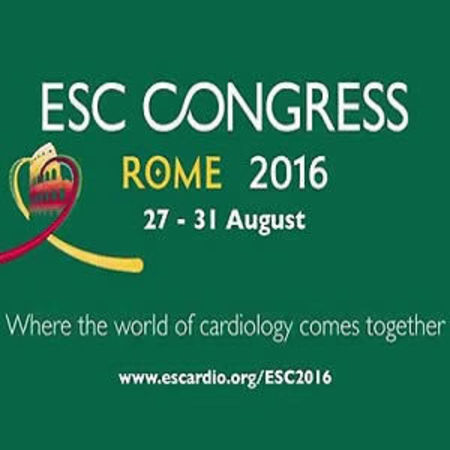With growing numbers of cancer patients and improved survival, the effects of cancer treatment on the cardiovascular system are receiving greater attention. The European Society of Cardiology (ESC) has published a position paper on tackling the cardiac toxicity of anticancer therapies. It aims to provide an expert consensus regarding current standards of care for patients with cardiotoxicity due to cancer treatment.
The Task Forces note that much is still unknown about radiation-induced and cancer drug–induced cardiovascular disease (CVD). They write that “the inability to predict the long-term consequences of cancer treatment–associated cardiovascular side effects leads to under- or overdiagnosis of CVD, sometimes resulting in the failure to prevent adverse events and sometimes to inappropriate interruption of a potentially lifesaving cancer treatment.
Professor Jose Luis Zamorano, Spain, Task Force Chairperson said: “We need to be clear when it’s a must to stop the treatment, when we should reduce the dose, or when we can continue with the therapy,” said Professor Zamorano. “This position paper provides guidance in this area.”
Professor Patrizio Lancellotti, Belgium, Task Force Co-Chairperson, noted that the good news about improved cancer treatment and survival was that there has been a progressive increase in cardiovascular events because radiation and anticancer drugs can be toxic to the heart. He said in a media release: “It is expected that among cancer survivors, cardiovascular disease will be the most important cause of death.”
The document outlines how anticancer treatments can harm the heart. There are nine categories of cardiovascular complications of anticancer therapy:
- Myocardial dysfunction and heart failure;
- Coronary artery disease;
- Valvular disease;
- Arrhythmias;
- Arterial hypertension;
- Thromboembolic disease
- Peripheral vascular disease and stroke;
- Pulmonary hypertension;
- Pericardial complications.
Prevention, Detection and Treatment
Electrocardiogram (ECG), cardiac imaging, and biomarkers can all be used to detect cardiotoxicity, according to the position paper. Pharmacological and non-pharmacological strategies can be used to prevent and treat cardiotoxicity. Cardioprotective drugs includeangiotensin converting enzyme (ACE) inhibitors or beta-blockers. Lifestyle measures include adopting a a healthy diet, not smoking, exercising regularly and controlling body weight. Aerobic exercise in particular is considered to be a promising non-pharmacological strategy both to prevent and treat cardiotoxicity,
Regarding long term surveillance for cancer survivors, patients should be informed of their increased risk of cardiovascular disease at the outset of chemotherapy, supported to make lifestyle changes, and instructed to promptly report early signs and symptoms of cardiovascular disease, says the Task Force.
Multidisciplinary teams comprising cardiologists, oncologists, nurses, and heart failure specialists and radiologists are essential to provide the best care for cancer patients and survivors. Cardio-oncology centres with a structured service should be set up.
Professor Lancellotti said: “We hope the paper will increase awareness about heart disease in cancer patients and survivors and stimulate more research in this area. More information is needed on when to screen and monitor patients, and on the cardiovascular effects of new anticancer therapies.”
Preventing Cardiotoxicity in Breast Cancer Patients
An example of prevention is that coadministering anthracyclines and trastuzumab in patients with breast cancer markedly increases the incidence of heart failure. But cardiotoxicity can be reduced significantly by introducing a drug-free interval between the two agents.
In research presented at the ESC Congress in Rome this week, a study from Romania, led by Professor Mirela Cleopatra Tomescu, a cardiologist at Victor Babes University of Medicine and Pharmacy, Timisoara, Romania, showed that nebivolol prevents anthracycline-induced cardiotoxicity. Nebivolol is a cardioselective beta blocker with anti-oxidant, anti-apoptotic and vasodilator properties which is used to treat hypertension and heart failure. The study group included 60 women with HER-2 negative breast cancer, with no pre-existing cardiac conditions, with a mean age of 52 ± 13 years, scheduled to start chemotherapy with doxorubicin. They were randomly divided into two groups, the control group (n=30) and the nebivolol-treatment group (n=30). Nebivolol was administered at a dose of 5 mg once daily, for the duration of chemotherapy. Cytostatic treatment was performed with doxorubicin 70 mg/m2, administered intravenously alone, every 21 days. There were six cycles of cytotoxic therapy. The average cumulative dose of doxorubicin was 520 ± 8 mg/m2.
Professor Tomescu said: “Conventional echocardiography showed no change in heart function in either group following chemotherapy. But the newer, more sensitive echocardiographic techniques showed heart damage after chemotherapy. Patients who received nebivolol were protected and had normal heart function. Our study demonstrates the utility of new echocardiographic methods such as tissue Doppler and speckle tracking imaging in the early detection of ventricular dysfunction induced by cytostatic treatment.”
Source and image credit: European Society of Cardiology
References:
Jose Luis Zamorano, Patrizio Lancellotti, Daniel Rodriguez Muñoz, Victor Aboyans, Riccardo Asteggiano, Maurizio Galderisi, Gilbert Habib, Daniel J. Lenihan, Gregory Y. H. Lip, Alexander R. Lyon, Teresa Lopez Fernandez, Dania Mohty, Massimo F. Piepoli, Juan Tamargo, Adam Torbicki, Thomas M. Suter on behalf of Authors/Task Force Members.
2016 ESC Position Paper on cancer treatments and cardiovascular toxicity developed under the auspices of the ESC Committee for Practice Guidelines.
DOI: http://dx.doi.org/10.1093/eurheartj/ehw211 ehw211
First published online: 26 August 2016
Latest Articles
Multidisiciplinary Teams Need to Address Cardiotoxicity, ESC Position Paper
Multidisiciplinary Teams Need to Address Cardiotoxicity, ESC Position Paper























